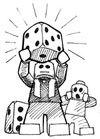The previous trick - The Supply Uncertainty Principle - proved itself quite popular, so I decided to share more of my GMing tricks with the community. I even decided to give this little segment its own tag, and a, somehow scientific, naming convention - so the readers can spot, and find those entries more easily.
Without further ado - I present you with another trick - this time we will look at giving XP to the players.
Disclaimer: Same as before- this trick was used solely in my Savage Worlds campaigns, but can be used easily in other games.
Without further ado - I present you with another trick - this time we will look at giving XP to the players.
Disclaimer: Same as before- this trick was used solely in my Savage Worlds campaigns, but can be used easily in other games.
Experience Points (XP), in one form or another, are a staple of RPGs. Nowadays most of XP given to the players are either points for killing enemies or fulfilling "quests". There, are alternatives, like the XP for gold spent in OSR games and even XP for hosting the game or bringing snacks in PDQ system.
Savage Worlds system, has its own approach, awarding XP depending on roughly how much of the planned adventure was accomplished during the session. I find this approach a little lacking, especially, when I am running no-prep games, where I have no idea what the game will be about. I needed something more, some kind of alternative...
Inspired by the video games' achievements, I devised a small system that gives a lot of fun to the players, and allows the GM to point the game in the direction he wants, without the feeling of railroading.
Let me introduce you to the Session Achievement Alternative.
Let me introduce you to the Session Achievement Alternative.
Before every session, get some post-it notes - one per player to be exact. Write 3-4, character specific, tasks on each of them and hand them to the players. If a player accomplished his task he gets 1XP (1XP is 20% of a "level" in Savage Worlds) there and then. It is that simple.
The tasks can be anything you want: from something that is linked to the adventure at hand, trough a "side quest", to acting in character. Even a meta-gaming task will work here. It is a good practice to try to get one of each type of tasks to a player. Create enough, so the player can choose his tasks and will not be punished for not fulfilling all of them during one session. Unresolved (or even some resolved and/or ongoing) tasks can be used in the future.
You can either collect the post-its, or leave them to the players as a souvenir. But make sure, that you have a set of new tasks per player for each session, and that, the players are aware that they can only get XP from "this week's" post-it.
Look at some Steam/Xbox achievements online for inspiration. Think of what the player would enjoy doing and what his character would do during the game (those might be two drastically different things). Think of a rumor in the game world and make exploring it one of the tasks. Don't be afraid of adding some tasks that will be difficult to achieve, or would require some out of the box thinking - players have a habit of surprising GMs.
Personally, I had a great experiences with this trick - so did my players. One player, kept it a secret, that he is a secret agent, trough a whole Deadlands campaign, getting 1 bonus XP every session. Another player took a "boss monster" 1on1 just because he would get extra points. This little change to awarding XP, allowed me and my players to explore the characters and the game world in a new way.
When used correctly, this trick can create some memorable moments in your game. Even if you are playing a game where you need to keep the character progression at bay (like D&D 3e for example) try it - just make the awards smaller (5-10% XP needed to "level up" per task) - the idea of "extra" XP will make the players do things you wouldn't normally expect from them.








